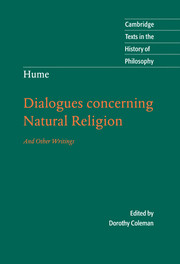Book contents
- Frontmatter
- Contents
- Acknowledgments
- Introduction
- Chronology
- Further reading
- Note on the text
- List of abbreviations
- DIALOGUES CONCERNING NATURAL RELIGION
- Pamphilus to Hermippus
- Part 1
- Part 2
- Part 3
- Part 4
- Part 5
- Part 6
- Part 7
- Part 8
- Part 9
- Part 10
- Part 11
- Part 12
- OTHER WRITINGS
- Index
- Cambridge Texts in the History of Philosophy
Part 7
Published online by Cambridge University Press: 05 June 2012
- Frontmatter
- Contents
- Acknowledgments
- Introduction
- Chronology
- Further reading
- Note on the text
- List of abbreviations
- DIALOGUES CONCERNING NATURAL RELIGION
- Pamphilus to Hermippus
- Part 1
- Part 2
- Part 3
- Part 4
- Part 5
- Part 6
- Part 7
- Part 8
- Part 9
- Part 10
- Part 11
- Part 12
- OTHER WRITINGS
- Index
- Cambridge Texts in the History of Philosophy
Summary
1 But here, continued Philo, in examining the ancient system of the soul of the world, there strikes me, all on a sudden, a new idea, which, if just, must go near to subvert all your reasoning, and destroy even your first inferences, on which you repose such confidence. If the universe bears a greater likeness to animal bodies and to vegetables, than to the works of human art, it is more probable, that its cause resembles the cause of the former than that of the latter, and its origin ought rather to be ascribed to generation or vegetation than to reason or design. Your conclusion, even according to your own principles, is therefore lame and defective.
2 Pray open up this argument a little farther, said Demea. For I do not rightly apprehend it, in that concise manner, in which you have expressed it.
3 Our friend Cleanthes, replied Philo, as you have heard, asserts, that since no question of fact can be proved otherwise than by experience, the existence of a deity admits not of proof from any other medium. The world, says he, resembles the works of human contrivance: Therefore its cause must also resemble that of the other. Here we may remark, that the operation of one very small part of nature, to wit man, upon another very small part, to wit that inanimate matter lying within his reach, is the rule, by which Cleanthes judges of the origin of the whole; and he measures objects, so widely disproportioned, by the same individual standard.
- Type
- Chapter
- Information
- Hume: Dialogues Concerning Natural ReligionAnd Other Writings, pp. 52 - 57Publisher: Cambridge University PressPrint publication year: 2007

